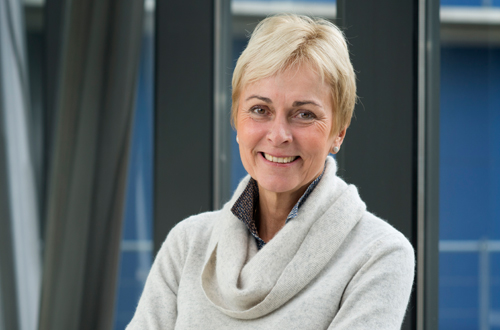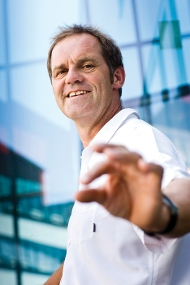Creating ‘organ-on-a-chip’ systems will be a decisive step toward personalized health care. Five partners including the University of Twente receive a prestigious ‘Zwaartekracht’ grant for this, of 19 million euros.
The partners are: University of Twente, Leiden University Medical Centre, University Medical Centre Groningen, Delft University of Technology and the Hubrecht Institute.
The new research programme, led by developmental biologist Christine Mummery (LUMC and University of Twente) targets at living cell and tissue culture outside the human body. On a tiny chip, the circumstances and functions of the body are mimicked. “What you create, is a tiny part of an organ”, Mummery says.

Prof Christine Mummery (LUMC and University of Twente)
Nanotechnology
The chip, for this purpose, has tiny fluid channels, for supplying the cells with nutrients and injecting medication. In special reservoirs, cells can grow and function just like in the human body. The University of Twente, receiving between three and four million euros from the 19 million euro grant, has a lot of knowledge and experience in the field of micro and nano chips and devices, also known as microfluidics. Prof Albert van den Berg, with his BIOS group, is an expert in this, making extensive use of the cleanroom facilities of the NanoLab of UT’s MESA+ Institute for Nanotechnology. The BIOS Lab-on-a-chip research is also part of the MIRA Institute for Biomedical Technology and Technical Medicine, of which Van den Berg is the scientific director.

Prof. Albert van den Berg
Blood vessels
He explains: “What’s unique about this new programme is that we are going to study the interaction between intestines, blood vessels and the brain. For this, we cooperate with top scientists in The Netherlands, including cell biologist Hans Clevers, neurologist Michel Ferrari and genetics expert Cisca Wijmenga. Our UT group will focus on sensors for micro analysis techniques.” One of the things Van den Berg is interested in, is the creation of blood vessel models using human cells: “Can we find these cells inside urine, for example? And can we use these model systems for personalized health care?” The scientists already founded the consortium for Human Organ and Disease Model Technologies (hDMT).
Less lab animals
A major advantage of organs-on-a-chip is that they can strongly reduce the number of laboratory animals. Mummery: “What happens inside animals, often is not representative for what happens inside a human being. A mouse’s heart rate is 500 beats per minute, more than eight times faster than that of a human being. Parts of the brains of mice work radically different from our brain, and the colon, for example, has a different function. We assume that using organs-on-a-chip, we will introduce better and faster tests of medication, including its side effects.”
Will the miniature versions of the brain, heart and intestines help us to bring a halt to diseases? “That’s a future perspective. Developing new medication takes a lot of time. This new project will run for 10 years. Our first focus is on understanding the causes of diseases and the way they develop. The next step will be a search for molecules that can stop or slow down these diseases. Some people have a genetic predisposition for a certain disease and get seriously ill, others don’t while they have the same genetic finger print. We want to know why that is.”
The Minister of Education, Culture and Science, Mrs. Jet Bussemaker, has made available 112,8 million euro for six large research projects, in the 2017 ‘Zwaartekracht’ (‘Gravity’) round. For a full overview of the projects, check the press release of NWO, the Netherlands Organisation for Scientific Research.





